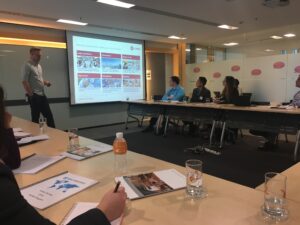Essential Tips for Studying Abroad
Planning your first international education experience? Whether you’re preparing for a faculty-led business program in Europe or a multi-destination learning adventure across Asia, having the right tips for studying abroad can transform your journey from overwhelming to extraordinary.
Since 1977, Global Learning Opportunities has guided 33,000+ students through transformative study abroad experiences. We’ve learned what works—and what doesn’t—when it comes to making the most of your time abroad. These aren’t generic travel suggestions; they’re battle-tested strategies from students who’ve successfully navigated international business seminars, cultural immersion, and personal growth across 650+ programs worldwide.
Let’s dive into the essential tips for studying abroad that will help you thrive, not just survive, during your international education adventure.
Before You Go: Pre-Departure Tips for Studying Abroad Success
Start Planning Early (Like, Really Early)
The most successful study abroad students begin looking into courses a year before departure, figure out budget and scholarships nine months in advance, apply to programs six to nine months ahead, and arrange visas, accommodation, and travel three to six months before leaving.
This timeline isn’t arbitrary—it’s designed to prevent last-minute panic and ensure you have time to secure scholarships, complete visa applications, and mentally prepare for your adventure.
Your Pre-Departure Checklist:
- Research your destination country’s business culture and customs
- Connect with GLO alumni who’ve visited your destinations
- Attend pre-departure orientations (they’re more valuable than you think)
- Start learning basic phrases in the local language
- Review travel advisories and learn about local laws and customs
Create a Realistic Budget (Then Add 20%)
One of the most crucial tips for studying abroad involves financial planning. Most students find that planning for about $1,000 per month is adequate, but costs vary dramatically by destination and lifestyle.
Smart Budgeting Strategies:
Break your budget into categories: needs versus wants. Separate essential expenses like food and transportation from discretionary spending on entertainment and travel. This framework helps you prioritize without feeling deprived.
Create a safety buffer of around $1,000 to keep you afloat in case of unexpected issues during your time abroad. Medical emergencies, missed flights, or oversized baggage fees can derail an otherwise perfect experience if you’re not prepared.
Use apps like Mint or create a simple spreadsheet to track spending. If you’re an app person, research your options in advance and make sure to check in regularly. If apps aren’t your style, use color-coded notes—green for essentials, yellow for fun, red for “oops” spending.
Master the Art of Packing Smart
Pack travel essentials, especially a travel backpack that fits the dimension requirements of free carry-on bags allowed on flights. Students who skip this regret it immediately when budget airlines charge steep fees for checked luggage.
Leave room in your luggage for things you’ll collect over the months abroad—you’ll accumulate more than you expect. That BMW factory tour might inspire a purchase, or you’ll find the perfect souvenir at a local market.
Essential Items Beyond Clothes:
- Copies of essential documents like your passport, driver’s license, and travel insurance
- Comfortable walking shoes for activities and excursions
- Universal power adapters and portable chargers
- Any prescription medications with documentation
- One professional outfit for business seminars and company visits
Financial Tips for Studying Abroad: Stretch Your Budget Further
Banking and Payment Strategies
When paying with a credit card, always choose to pay in the local currency rather than your home currency to get the best exchange rate and avoid dynamic currency conversion fees. This simple choice can save hundreds over a semester.
Before departure, notify your bank about your travel dates and destinations to prevent your card from being shut off. Bring a widely accepted credit card like Visa or Mastercard, a backup card, and some cash in your host country’s currency.
Purchase a local SIM card with a monthly plan—options around $18 per month with decent data are common and save significantly compared to international roaming charges. Your data rolls over each month, and you can text family back home while traveling throughout your host region.
Money-Saving Hacks That Work
Transportation: Walking is one of the most effective ways to save money while traveling abroad, providing both exercise and the best way to learn about a new place. When walking isn’t practical, use public transportation over taxis. Many cities offer student transit passes at discounted rates.
Accommodation for Weekend Trips: Use HostelWorld to find affordable hostels, which are not only budget-friendly but also a fun way to meet other travelers. Many hostels organize free or heavily discounted tours and social events.
Flight Deals: Use Skyscanner to check all airlines and find the cheapest flights for selected dates, with features to see prices for the whole month or compare different destinations. Flexibility with travel dates can save hundreds of dollars.
Food and Dining: Visit local markets where you can buy in bulk at lower prices instead of shopping in tourist areas. Cook with friends to split grocery costs and make it a bonding experience while experimenting with local ingredients.
Keep your student ID handy—many businesses provide student discounts, and by displaying your student status, you may have discounts automatically applied. This works at museums, restaurants, transportation systems, and entertainment venues.
Cultural Adjustment: Navigating Your New Home Abroad
Understanding Culture Shock Is Normal
All students experience some degree of culture shock when they arrive in their host country, regardless of previous experience, maturity, or knowledge of the country. Recognizing this helps you prepare mentally.
The Phases You’ll Experience:
Initial euphoria (the “honeymoon period”) lasting from one week to a few months, followed by irritability and hostility as you take a more active role in your community, eventually leading to gradual adjustment as you interpret cultural cues you hadn’t noticed before.
Understanding these predictable phases removes the fear and guilt many students feel when the initial excitement fades. You’re not failing—you’re progressing through a normal adaptation process.
Strategies for Thriving During Cultural Transition
Make close friends with host nationals to help you learn about your new culture and give you someone to listen to your problems. These relationships provide invaluable insights no guidebook can offer.
Take the first month to “be a tourist in your own home”—explore your host city thoroughly before jetting off to other destinations. Students who plan too many trips to other locations often lose the opportunity to deeply understand their home base.
Show genuine interest in the host country by getting to know its intricacies of daily life and social norms. Ask questions, observe carefully, and seek to understand without judging when something is different than expected.
When Culture Shock Hits Hard: Get enough rest (you’ll probably need more than usual), meet local people to learn about the culture, and focus on the positive while learning from the negative. If symptoms don’t go away or worsen, talk to your program coordinator.
Safety Tips for Studying Abroad: Stay Secure and Confident
Essential Safety Practices
Be mindful of your surroundings, learn the local laws and customs, and keep a low profile. What’s acceptable at home might be illegal or culturally offensive abroad.
Enroll in the Smart Traveler Enrollment Program (STEP) to receive important information from the U.S. embassy about safety conditions and help them contact you in an emergency. This free service has literally saved lives during natural disasters and political unrest.
Keep your cell phone charged and with you at all times, and learn the in-country emergency number equivalent to 911. Store important contacts—program staff, faculty leaders, embassy numbers—in your phone, photos, and email in case you lose device access.
Smart Social Safety
If you choose to consume alcohol, drink responsibly, in moderation, and in compliance with local norms. Alcohol impairs judgment, coordination, perception, and concentration, and accidents and injuries are more common among those who consume too much.
Identify ways to blend in with the local culture to avoid being targeted as a tourist, and listen to your instincts—if a situation feels unsafe, speak up or remove yourself.
Maximizing Your Business Learning Experience
Making the Most of Executive Seminars
GLO’s signature “first business trip abroad” approach means you’ll attend seminars with executives from multinational corporations like BMW, Coca-Cola, and other industry leaders. These aren’t typical tourist experiences—they’re genuine professional development opportunities.
How to Prepare:
- Research the companies you’ll visit beforehand
- Prepare intelligent questions about international operations
- Dress professionally and bring business cards (yes, even as a student)
- Take notes during presentations for future interviews and networking
- Exchange LinkedIn connections with executives and fellow participants
Follow-Up Matters: After company visits, send brief thank-you emails to presenters. Mention specific insights they shared and how they connected to your academic or career interests. This professionalism distinguishes you from tourists and creates lasting networking opportunities.
Building Your International Network
Strategic Relationship Building
One of the most valuable yet overlooked tips for studying abroad involves networking. The connections you make—with executives, faculty, local professionals, and fellow students—often lead to internships, jobs, and collaborations years later.
Networking Best Practices:
- Collect contact information from everyone you meet
- Connect on LinkedIn immediately (people forget faces but remember timely connections)
- Share your study abroad experience genuinely, not as a sales pitch
- Follow up periodically with valuable content or updates
- Attend all optional networking events and social gatherings
Don’t just stick to friends from your home school—venture out to meet new people for a truly immersive experience. Students who exclusively socialize with their home institution cohort miss incredible opportunities for diverse perspectives and authentic cultural exchange.
Academic Success While Abroad
Balancing Coursework and Exploration
Maintain your academics by attending classes, completing assignments, and communicating with professors. The temptation to prioritize travel over studying is real, but falling behind academically creates stress that undermines your entire experience.
Study Strategies:
- Use travel time for reading assignments
- Form study groups with international students
- Relate coursework to your experiences in-country
- Document company visits and cultural observations for assignments
- Communicate proactively with professors about any challenges
Earning Credit That Counts
Ensure the courses you take abroad fulfill degree requirements. Work with your academic advisor before departure to confirm credit transfer policies and course equivalencies. GLO programs are designed to provide university credit through immersive, career-focused curricula—but you still need to verify everything aligns with your degree plan.
Weekend Travel Tips for Studying Abroad
Balancing Exploration and Budget
There’s pressure to travel every weekend, but staying local and really getting to know your host city can be equally valuable. The time abroad goes by quickly, so if you plan too many trips to other locations, you may lose out on exploring your study abroad country.
Smart Travel Planning:
- Prioritize one big splurge—something meaningful like a weekend trip to visit a city your ancestors came from or an experience that inspired you to choose your destination
- Accept that everyone has different budgets, and if yours is smaller, think carefully before saying yes to trips that aren’t your top choices
- Book transportation and accommodation well in advance for better prices
- Consider free walking tours through apps like GuruWalk
Arrive a few days before your program starts if possible to sleep off jet lag and explore your new home, requiring a hotel or Airbnb but proving worthwhile. The same applies to departure—give yourself buffer time rather than rushing to the airport immediately after your last class.
Personal Growth Tips for Studying Abroad
Embracing Discomfort and Challenge
Plan for low points and potential disappointments to help focus on making the most of a trip that is exciting, challenging, and life-changing. The most transformative moments often emerge from difficult situations.
Try a solo trip, even though it’s intimidating—it’s one of the biggest recommendations for anyone going abroad. Solo travel builds confidence, self-reliance, and problem-solving skills that benefit you long after returning home.
Documenting Your Journey Meaningfully
Don’t just take photos—reflect on your experiences through journaling, blogging, or regular video updates. Choose to be present in the moment instead of constantly taking photos to make the time more meaningful and help you notice cultural clues.
What to Document:
- Your observations about business practices and cultural differences
- Challenges you overcame and what you learned
- Specific skills you developed
- Relationships and their significance
- How your perspectives changed over time
This documentation becomes invaluable when updating your resume and preparing for job interviews. Employers don’t just want to hear you studied abroad—they want specific examples of how the experience developed your professional capabilities.
Returning Home: Re-Entry Tips for Studying Abroad
Managing Reverse Culture Shock
Many students returning home experience reverse culture shock without realizing it—you’ve had a transformative experience, changed and grown significantly, and return to a place where everything feels different because you’re so different.
Re-Entry Strategies: Answer these questions before returning: How will you contextualize your experience? What aspects are most important to share? Which details are suitable for brief conversations, and which are better saved for deeper conversations with people who want to understand what made the experience meaningful?
Join international clubs or alumni associations from your foreign program to find support. Create new experiences in a familiar place—even something as simple as checking out a new museum—to maintain the growth mindset you developed abroad.
Leveraging Your Experience Professionally
Transform your international experience into career capital:
- Add an “International Experience” section to your resume
- Prepare specific stories demonstrating cross-cultural problem-solving
- Quantify your experience (e.g., “Analyzed operations at three manufacturing facilities across Germany and Czech Republic”)
- Connect international insights to employers’ global business needs
- Reference executive conversations and company visits in interviews
The GLO Advantage: Tips for Studying Abroad Successfully
What makes Global Learning Opportunities different is our intentional design around professional development. Our faculty-led, multi-destination programs combine the support structure students need with the business exposure employers value.
Why Faculty-Led Programs Excel:
- Expert faculty integrate academic theory with real-world applications
- Built-in support system provides security while pushing growth
- Structured itineraries maximize your time in each destination
- Pre-arranged company visits and executive seminars save you months of networking effort
- Group dynamics create lasting professional relationships
Since 1977, we’ve refined the art of transforming short-term programs into long-term career advantages. Our 33,000+ alumni didn’t just visit other countries—they developed the global competency and international networks that define successful careers in our interconnected world.
Your Study Abroad Success Starts Now
The best tips for studying abroad come from students who’ve already walked this path. They’ve learned that success requires preparation, flexibility, cultural humility, financial savvy, and the courage to embrace discomfort.
Your study abroad experience isn’t just about collecting passport stamps or Instagram photos. It’s about developing the cross-cultural skills, global perspective, and professional network that set you apart in competitive job markets. It’s about becoming the person who can confidently navigate unfamiliar situations, build relationships across cultural boundaries, and see business challenges from multiple perspectives.
These tips for studying abroad are your roadmap—but the journey is yours to create.
Ready to Experience Your First Business Trip Abroad?
Explore GLO’s upcoming programs designed to build global competency and accelerate your career. Our faculty-led, multi-destination programs connect you with international business leaders through executive seminars at multinational corporations across Europe, Asia, and Latin America.
Applications are now open. Don’t wait to gain the international business experience that could define your career trajectory. Visit our website to discover programs tailored to your academic interests and professional goals.
Connect with GLO alumni who can share firsthand tips for studying abroad on our specific programs, answer questions about destinations, and help you prepare for your international business education adventure.
Frequently Asked Questions: Tips for Studying Abroad
1. How much money should I budget for studying abroad?
The amount you need depends on your destination, program length, and lifestyle. Most students find that budgeting approximately $1,000 per month works well, but this varies significantly. For expensive cities like London or Tokyo, plan for more; for destinations in Latin America or Southeast Asia, you might need less.
Create a detailed budget that separates fixed costs (program fees, housing, required materials) from variable costs (food, entertainment, weekend travel). Use tools like numbeo.com to research cost of living in your specific destination. Include a buffer of around $1,000 for unexpected expenses like medical issues or flight changes.
Smart budgeting tips: Track your spending weekly using apps like Mint or a simple spreadsheet. Take advantage of student discounts everywhere by keeping your student ID handy. Walk whenever possible rather than taking taxis, and explore free activities and museum exhibitions in your host city. Cook meals with friends to split grocery costs and make it a bonding experience.
Consider all expenses: program tuition, airfare, visa fees, insurance, meals not covered by your program, local transportation, phone service, toiletries, and discretionary spending on travel and entertainment. Then add 15-20% for unexpected costs.
2. What should I do to prepare for culture shock?
Culture shock is completely normal and predictable—almost everyone experiences it. The process typically includes initial euphoria (the “honeymoon period”), followed by irritability and hostility, and eventually gradual adjustment as you begin interpreting cultural cues.
Before departure: Research your destination’s cultural norms, business etiquette, and social customs. Try learning the language or at least some basic phrases to help you communicate. Connect with students who’ve studied in your destination to learn what surprised them most. Attend all pre-departure orientations offered by your program—they provide invaluable preparation.
During your program: Make close friends with host nationals who can help you learn about the culture and listen to your problems. Get enough rest (you’ll probably need more than usual), and focus on the positive while learning from the negative. Be respectful and courteous as a guest, avoiding negative opinions or generalizations about your host community.
Spend your first month exploring your host city thoroughly before planning major trips elsewhere. This helps you establish a comfortable home base. If symptoms don’t improve or worsen, don’t hesitate to contact your program coordinator or advisor—they’re experienced with helping students through adjustment challenges.
3. How can I stay safe while studying abroad?
Safety abroad requires awareness, preparation, and common sense. Learn local laws and customs, be mindful of your surroundings, and keep a low profile. What’s legal and socially acceptable at home might be very different in your host country.
Essential safety measures: Enroll in the Smart Traveler Enrollment Program (STEP) to receive safety alerts from the U.S. embassy and enable them to locate you in emergencies. Keep your cell phone charged and with you always, and learn your host country’s emergency number equivalent to 911. Store critical contact information—program staff, faculty, embassy, emergency services—in multiple places: your phone, email, and photos.
Listen to your instincts—if a situation feels unsafe, speak up or remove yourself immediately. Identify ways to blend in with local culture to avoid being targeted as a tourist. Research how locals dress and behave to avoid standing out unnecessarily.
Alcohol and social safety: If you choose to drink, do so responsibly and in moderation, following local norms. Alcohol significantly increases risk of theft, assault, and accidents abroad. Check in regularly with family and friends, and consider using location sharing with trusted contacts.
Make copies of essential documents like your passport, driver’s license, and travel insurance before departure. Keep digital copies in cloud storage and physical copies separate from originals. Know how to contact your program’s emergency services 24/7.
4. Will studying abroad delay my graduation?
Not if you plan carefully. With proper planning and consultation with your academic advisor, you can identify courses that fulfill degree requirements while studying abroad. In fact, students who study abroad often have higher graduation rates than those who don’t.
Planning strategies: Start conversations with your academic advisor at least one year before your intended departure. Verify that credits from your program will transfer and count toward your degree requirements—don’t assume anything. GLO’s faculty-led programs are designed to provide university credit through courses that typically fulfill business, international studies, or elective requirements.
Most students who study abroad graduate on time by planning courses carefully before departing and confirming credit transfer with their study abroad office. If you’re concerned about required course sequences, consider short-term programs during summer or winter breaks that don’t interfere with your regular academic calendar.
Additional benefits: Some students accelerate their progress by taking courses abroad that aren’t offered at their home institution or by using the experience to clarify their career direction, avoiding unnecessary major changes. The key is proactive communication with advisors and careful course selection.
Faculty-led programs like GLO’s offer particular advantages because the sending institution often pre-approves credits, eliminating uncertainty about transfer credits. Your professor facilitates credit approval and understands your degree requirements.
5. How do I make the most of networking opportunities during my study abroad program?
Networking abroad creates professional relationships that can influence your career for decades. The executives and professionals you meet through programs like GLO aren’t just giving presentations—they’re potential mentors, references, and hiring managers.
Before company visits: Research the organizations you’ll visit and the executives you’ll meet. Prepare 2-3 intelligent questions about their international operations, market challenges, or career paths. Bring business cards (yes, even as a student—make simple ones online). Dress professionally and arrive early.
During seminars: Take detailed notes during presentations—not just what they say, but insights about corporate culture, international business practices, and industry trends. Be present in the moment instead of constantly taking photos to notice cultural clues and make meaningful connections. Participate actively in Q&A sessions.
After interactions: Connect on LinkedIn within 24 hours while the meeting is fresh in everyone’s mind. Send brief, personalized thank-you emails mentioning specific insights they shared and how they connect to your academic or career interests. This professionalism distinguishes you from tourists.
Long-term networking: Don’t just stick to friends from your home school—venture out to meet international students and local professionals. Join all optional networking events and social gatherings. Follow up periodically by sharing relevant articles, congratulating career milestones, or providing updates about your own progress.
Leverage your network: When applying for jobs or internships, mention specific executives you met and companies you visited. Reference their insights in cover letters and interviews. These concrete examples demonstrate genuine international experience rather than just tourism. Many GLO alumni credit their first jobs to connections made during program seminars.
The key is authenticity—focus on learning and building genuine relationships rather than collecting contacts. The professional network you build during your study abroad experience often becomes one of its most valuable outcomes, opening doors throughout your career.
Have more questions about studying abroad with GLO? Drop your questions in the comments below, and our team will help you learn more about our international business programs, destination options, budgeting strategies, and how to get started on your first business trip abroad.
Join the conversation! Connect with current GLO participants and alumni who can share their personal tips for studying abroad, answer questions about specific destinations, and help you prepare for the adventure of a lifetime.
Global Learning Opportunities has connected 33,000+ students and professionals with international business leaders through 650+ executive seminars worldwide since 1977. Discover how our faculty-led, multi-destination study abroad programs can accelerate your global career and provide the international experience employers value most.




